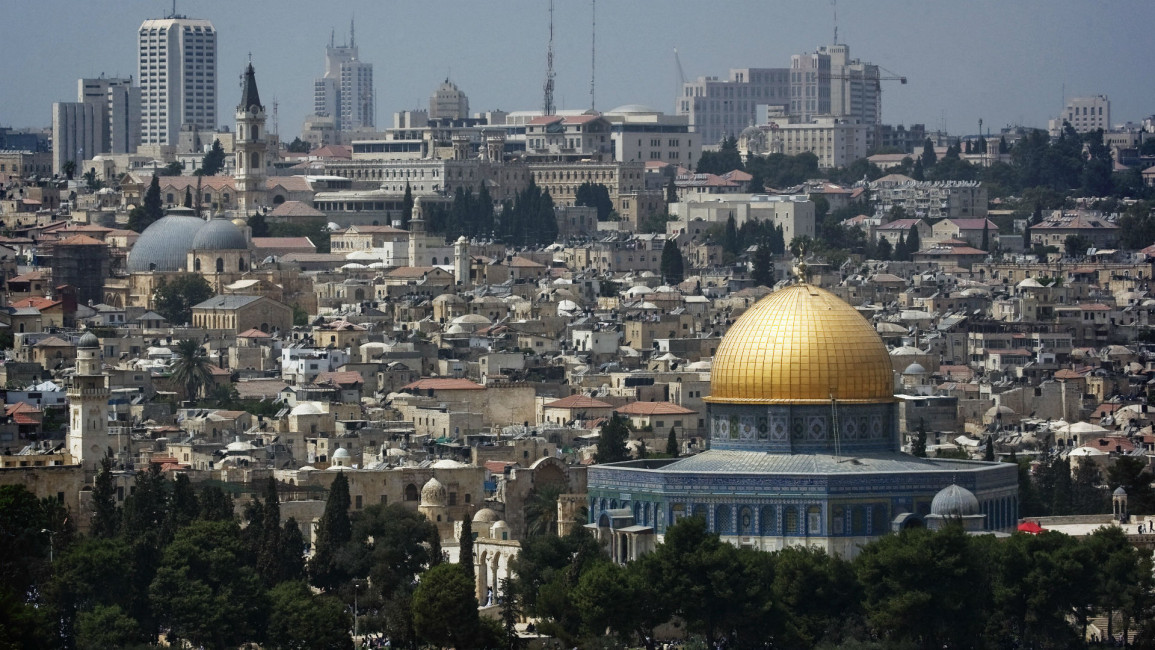Israel approves 1600 settlement units in Jerusalem as Bennett says 'no foreign intervention' on Al-Aqsa
Israeli authorities approved three construction plans to build 1600 new settlement units in Jerusalem, Israeli media reported on Monday.
The new units are planned in the French Hill settlement in eastern Jerusalem, to expand the premises of the Hebrew University. The project was approved by the Israeli Jerusalem municipality's planning authority and is expected to be approved by the Israeli ministry of interior.
The plan includes student dorms, rent apartments and three residential towers, enlarging the existing settlement built in 1968 on the lands of Jerusalem’s Mount Scopus.
In addition, Israeli authorities approved the construction of 400 new residential units on Mount Abu Ghneim, north of Bethlehem, enlarging the Israeli settlement of Har Gilo built as an extension to the Israeli boundaries of Jerusalem in 1996.
The Israeli planning and construction committee has approved new permits for 1600 settlement units in occupied Jerusalem.
— Jerusalem24 (@J24FMPalestine) May 9, 2022
Read More on our Website:https://t.co/Vq2ZCMkuQx
#Palestine #jerusalem
The approved units are "part of older plans made in the early 1990s of Israel's 'Jerusalem 2020' plan," Khalil Tafakji, the top Palestinian expert on Israeli settlements in Jerusalem and director of the maps unit at Jerusalem's Orient House, told The New Arab.
"The French Hill was the first settlement to be built in Jerusalem right after the Israeli occupation of eastern Jerusalem, and the idea has always been to enlarge it to saturate the northern part of Jerusalem and connect it to settlements around the city, east and south," he added.
"The Har Gilo settlement on Mount Abu Ghneim serves the same purpose in the south, expanding the Israeli Jerusalem boundaries deep into the Bethlehem area," Tafakji pointed out.
"The 'Jerusalem 2020' plan served the long-standing settlement strategy, which is why it has been carried out under left-wing and right-wing governments alike," he stressed, in reference to the fact that the plan was created during the government of Yitzhak Rabin.
Jerusalem2050: A largely-Jewish high-tech tourist destination with a minimal Palestinian presence. This is Israel’s vision of the city, & it is being implemented through three master plans.
— Al-Shabaka الشبكة (@AlShabaka) December 30, 2021
Nur Arafeh provides a succinct analysis of all three plans (2016) https://t.co/tjr7iHGvg3
The approvals arrive two days after Israeli prime minister Neftali Benett declared that Israel "will not accept foreign interference in decisions regarding the Temple Mount", in reference to the Al-Aqsa compound and the Jordanian custody over Jerusalem’s holy sites.
Jordan's custody and its role in the administration and maintenance of holy sites is part of Jerusalem's "status-quo", which has remained unchanged since 1967. The international community widely opposes any changes to Jerusalem's status quo until a political agreement over the city is reached.
Palestinian minister of Jerusalem affairs, Fadi Al-Hedmi, condemned Bennet's declarations in a statement to the Palestinian press, calling them "a unilateral declaration of ending the status quo."
Palestine's permanent ambassador to the UN, Riyadh Mansour, addressed on Monday a letter to each of the UN Secretary-General, the UN general assembly president and the UN security council presidency, held for the present month by the US, responding to Bennet's declarations.
"Israel has no sovereignty rights over the occupied Palestinian territory, including eastern Jerusalem, according to international law," read the letter.
"It has absolutely no right to implement its unlawful colonial plans on our territory, including Jerusalem’s old city, the holy sites and Al-Aqsa mosque," it continued.
Israeli occupation authorities approved one billion shekels to fund several major projects that will link all illegal Jewish-only settlements in the eastern part of occupied Jerusalem to the western part of the city.#FreePalestine pic.twitter.com/APFiNo8O6c
— PALESTINE ONLINE 🇵🇸 (@OnlinePalEng) February 8, 2022
During the Muslim holy month of Ramadan, Israeli police forcibly evacuated Palestinians from the Al-Aqsa compound at multiple moments, allowing extremist Israeli settlers to storm the compound.
During the evacuation, Israeli police forces arrested 781 Palestinians, including 425 arrested in a single day, while 323 Palestinians were banned from entering the Al-Aqsa compound.
The numbers were made public by the Israeli chief of police and were quoted by the Israeli Knesset on Monday following a meeting of the Knesset's interior security committee. The statement specified that "it was difficult to gather evidence to continue detaining them."



